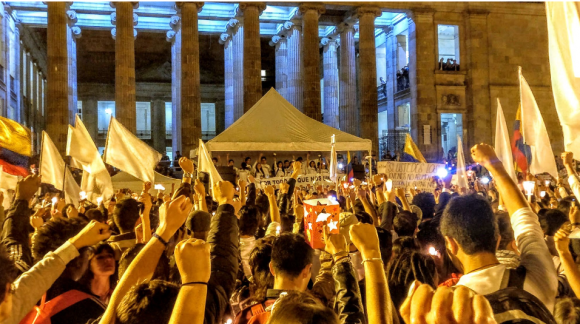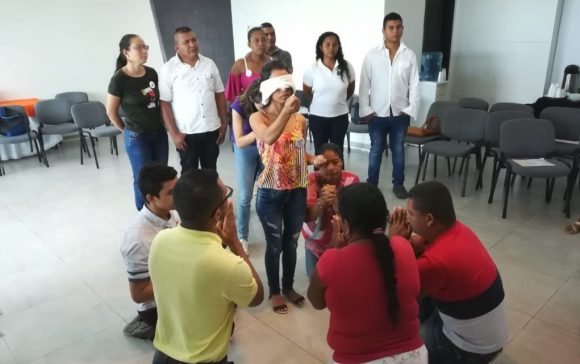Democracy isn’t built in a day: The case of Colombia

Whenever any country makes its first hopeful steps towards a more democratic government, we are easily inclined to conclude that it has become a democracy.
But real democracy is more than just elections.
It is diversity, accountability and inclusion… It is politicians and political institutions that respond to the needs of the population, and it is a population that calls its politicians to account. And these changes require much more time.
In this series of articles, written by journalist Joris Tielens for the NIMD-Vice Versa Democracy Special, we explore the aftermath of the first steps towards democracy in two very different countries: Tunisia and Colombia.
Part 2: Colombia
The last few years have seen huge expectations for a more open and inclusive democracy in Colombia. However, the underlying motive for strengthening democracy is not to improve the economy and welfare, as is the case in Tunisia, but to foster peace.
After the Peace Agreement
Following decades of war and attacks, the Colombian Government finally signed the Peace Agreement with the FARC in 2016. The rebels surrendered their weapons and the FARC became a legal political party that won seats in the country’s Parliament. A court was established to try the perpetrators of the violence.

But other parts of the Peace Agreement were not implemented, says Ángela Rodríguez Sarmiento, who heads the NIMD office in Bogotá: ‘The newly-elected President lacks the political will to fulfil the Peace Agreement in an effective manner.’
Victims of the violence were to receive special parliamentary seats as well as reparations, while those regions that the FARC had previously controlled – the Colombian borderlands – were to receive aid for the purpose of redeveloping security, healthcare and education.
This did not happen, says Rodríguez, and, as a result, a power vacuum was created in those regions, regions that are no longer controlled by the FARC nor by the national authorities. ‘That has given free rein to illegal activities, drug dealing and growing coca.’

A rise in violence
Recently, violence has been on the upswing once again in Colombia. The inability of the authorities to control those regions was one of the underlying causes of the conflict with the FARC, says Rodríguez, and is once more the cause of the rising tide of violence.
‘Those who profit from illegal activities gain from political instability. If they were legally part of the political system, they would be unable to conduct their illegal trade.’
That makes it all the more important that the victims of that violence, many of whom are women, young people, indigenous peoples and Afro-Colombians, receive improved political representation, according to Rodríguez. ‘Political participation is the key. The FARC became an armed guerrilla movement because it was excluded from the political process. For many years, the system could only be accessed by a handful of people, primarily white males.’
NIMD in Colombia
But such a process does not happen automatically. After the Peace Agreement was reached, NIMD was tasked with playing a part in democratization and bolstering political participation, and is now running programmes in eight of sixteen departments that the Government and FARC declared the worst-affected by the conflict.

NIMD’s presence grew from two people to seventeen, and Democracy Schools trained politicians, members of civil society and citizens in political skills and how to conduct peaceful dialogue.
‘Democracy is not just about arranging elections,’ says Rodríguez. ‘It’s also about how those people who are elected are called to account.’ But before they can focus on training, she is well aware that safety must be guaranteed.
‘That has to come first. We work together with the government staff responsible for safety as well as with political parties to protect those who express themselves politically. Political parties are often unaware who their own candidates are and these people are not protected.’
Looking to the future
What does Rodríguez think the future holds?
‘The people are losing faith in the Peace Agreement. After 60 years, war and violence had become the norm for Colombians. Murder and kidnapping were seen as standard parts of the political process.
‘When the guns went silent and the attacks in the cities ceased, most people thought that the problem had been solved. But there are still many issues that underlie the conflict and that still exists: corruption and the illegal production and trade of drugs; the lack of properly functioning state institutions in the departments; and the lack of representation for large groups of society.
‘The people on the street, those who vote for their candidates during elections, still have to learn to monitor the people in power. And they must also learn to demand transparency and accountability from those they elect.
‘We have to wake them up. Elections have been held but we still have to create a democracy that overcomes the old and traditionally corrupt ways of doing politics.’
On Monday 10 February, NIMD is partnering up with Vice Versa to host “Talkshow: Een Inclusieve Democratie” in The Hague. The talkshow will bring experts from the forefront of the democratization movement together, featuring current and former politicians and experts from civil society.
